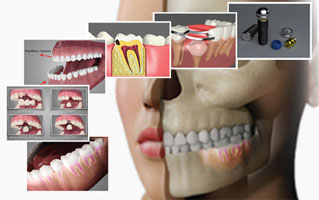FAQs
ORAL SURGERY
What are wisdom teeth?
Also called third molars, wisdom teeth usually make their first appearance in young adults between the ages of 15 to 25. Because most mouths are too small for these four additional molars, an extraction procedure, sometimes immediately after they surface, is often necessary.
When should wisdom teeth be removed?
The following symptoms may indicate that the wisdom teeth have erupted and surfaced, and should be removed before they become impacted -- meaning, the teeth have surfaced and have no room in the mouth to grow. However, each individual may experience symptoms differently. Symptoms may include: pain infection in the mouth, facial swelling, swelling of the gum line in the back of the mouth. Most oral health specialists will recommend an immediate removal of the wisdom teeth, as early removal will help to eliminate problems, such as an impacted tooth that destroys the second molar.
What problems are often associated with impacted third molars?
- Bacteria and plaque build-up
- Cysts development (a fluid-filled sac)
- Tumor development
- Infection
- Jaw and gum disease
What is involved in the extraction procedure?
Wisdom tooth extraction surgery involves removing the gum tissue that presides over the tooth, gently detaching the connective tissue between the tooth and the bone, removing the tooth, and suturing the opening in the gum line.
What is a Dry Socket?
Dry Socket is the most common complication of extraction. (removing a tooth) Most commonly associated with wisdom teeth extractions & lower molar extraction. Dry Socket is one in which the patient is having pain due to the loss of the blood clot from the socket following extraction, thus exposing the bone to air, food, and fluids. Patient experiences excruciating pain along with an offensive odor. This often occurs two or more days after an extraction and can last about 5-6 days. This condition occurs most commonly -
- In individuals who smoke before their recommended time. Smoking: decreases healing, decrease blood supply to the protective blood clot, brings toxic products to the area, injuries the gum tissue and the negative pressure of sucking removes the blood clot from the surgery site.
- If you do not care for your extraction site as instructed by staff.
- Not following your home care instructions.
- Sucking action from smoking, sneezing, coughing, spitting or sucking, within the first 24 hours.
- Women taking oral contraceptives are more susceptible.
What are dental implants?
Dental Implants are made of titanium and placed directly into your jawbone surgically. Once they integrate with your bone, a crown, bridge or denture is placed over the implants.




